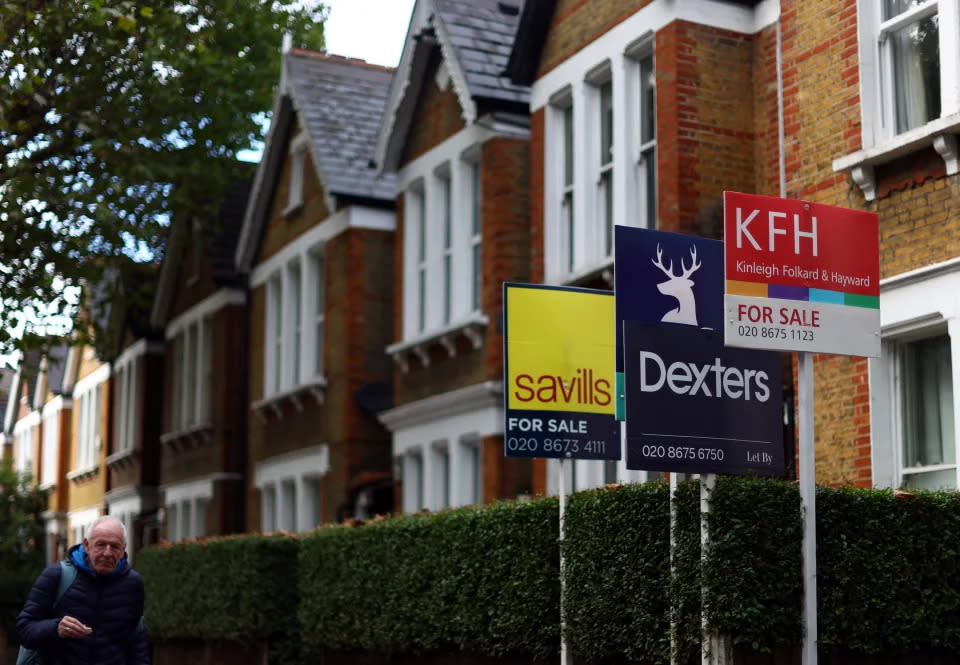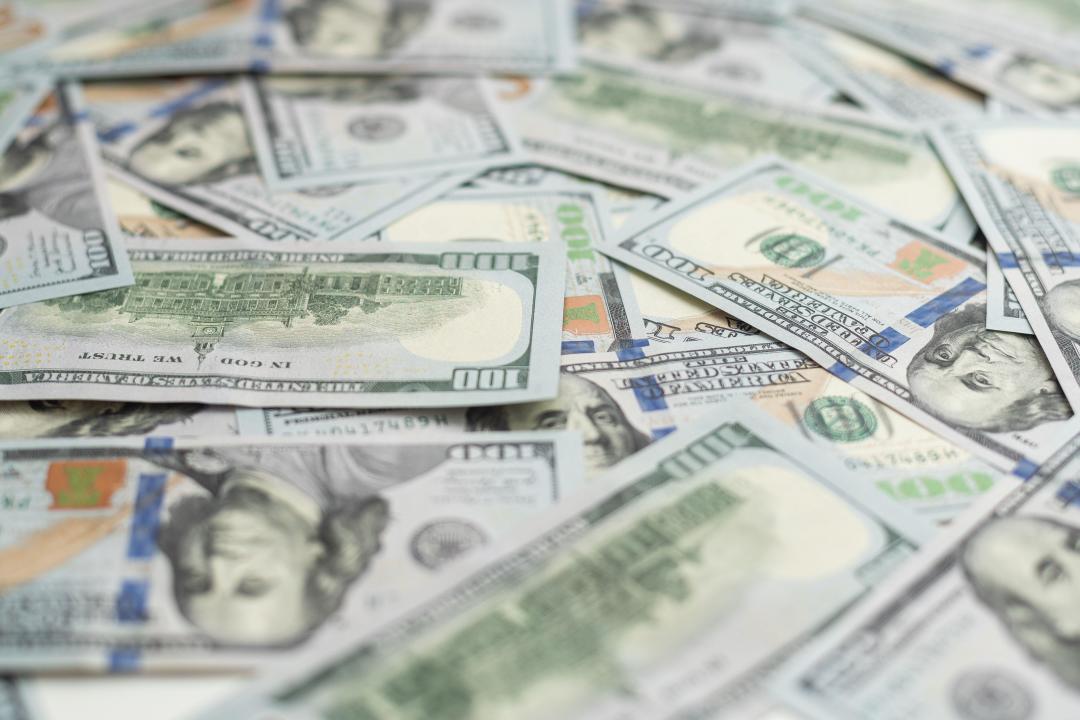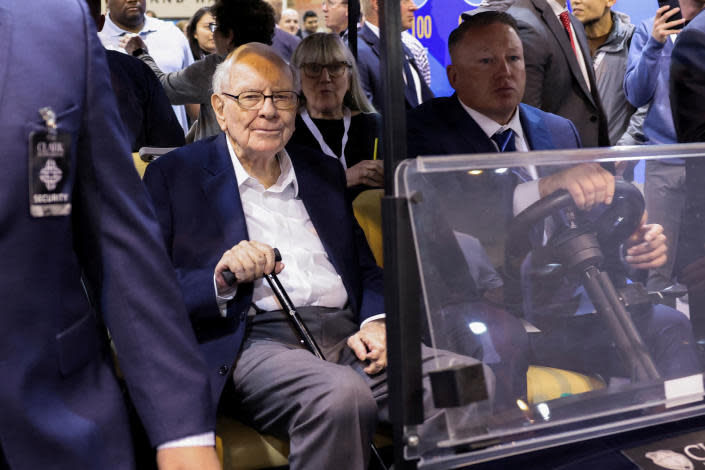European stocks fall as Japanese economy shrinks faster than expected


The FTSE 100 (^FTSE) and European stocks were lower on Thursday as new data revealed that the Japanese economy contracted faster than expected.
Gross domestic product (GDP) in the country shrank at an annualised rate of 2% in the January to March period, compared to the previous quarter, worse than the 1.5% drop in activity forecast.
This works out as a 0.5% quarterly drop in activity, as households and companies cut back. Weak consumer spending dragged on growth, alongside a fall in capital spending and net exports.
Data for the fourth quarter of last year was also revised down to show GDP was flat.
-
London’s benchmark index was flat in noon trade after its recent record-breaking run
-
Germany’s DAX (^GDAXI) dipped 0.3% and the CAC (^FCHI) in Paris headed 0.4% into the green
-
The pan-European STOXX 600 (^STOXX) was also treading water
-
Wall Street is set to open marginally higher as S&P 500 futures (ES=F), Dow futures (YM=F) and Nasdaq futures (NQ=F) were all in the green
-
The pound (GBPUSD=X) was slightly down against the US dollar at 1.2659 after US inflation eased
Sophie Lund-Yates, lead equity analyst at Hargreaves Lansdown, said: “The FTSE 100 has shed points after setting another record on Wednesday. The investor confidence boost from Wednesday’s encouraging inflation data in the US is being partially offset by wider thoughts on a busy day for company earnings.
“The overall mood remains bright though, with losses relatively minimal. That’s thanks to that inflation data – while the path to disinflation was never going to be without bumps, this latest indicator suggests things are moving in favour of Federal Reserve interest rate cuts this year – albeit this can change at short notice.”
Follow along for live updates throughout the day:
Live15 updates
-
Best UK mortgage deals of the week


Mortgage rates have eased slightly this week but future homeowners are still struggling to find a decent price and more are taking loans well into their retirement age.
The average rate on a two-year fixed deal this week stood at 5.69%, below the previous 5.85%. while rates for a five-year deal came in at 5.24%, also lower than last week’s 5.39%, according to figures from Uswitch.
This follows the Bank of England‘s (BoE) decision to leave UK interest rates on hold at their current 16-year high of 5.25% for a sixth consecutive time.
With just two BoE cuts now expected in 2024, several lenders have raised rates – adding pressure on homebuyers and those looking to remortgage.
-
Oil rises as US stockpiles decline
Oil rose for a second day on Thursday amid shrinking US stockpiles and a wider risk-on mood triggered by signs of ebbing US inflation.
Brent crude, the global benchmark, has fallen 0.4% towards $82 a barrel after climbing 0.5% on Wednesday. US-produced West Texas Intermediate was down towards $78.
US oil inventories fell by 2.5 million barrels last week for the first back-to-back drop since March, taking nationwide holdings to the lowest in almost a month.
It comes as the International Energy Agency (IEA) said on Wednesday that global oil stockpiles jumped by 34.6 million barrels in March.
Data from the OPEC cartel on Tuesday showed that many countries that are supposed to be cutting output are actually producing more than their quota.
The risk to supply chains from the conflict in the Middle East is also thought to be waning.
Warren Patterson, head of commodities strategy for ING Groep NV, said:
“Recent macro data from the US has raised expectations that the Fed could start cutting rates soon, which will be providing some support to oil.”
-
US dollar stabilises


Very big amount of US hundred dollar bills close up. Huge quantity of united states currency notes on flat table (Andrew Angelov) The US dollar stabilised in early Thursday trading, following its worst day of the year, with the index measuring the greenback’s performance against other major currencies dropping around 0.75%.
Ricardo Evangelista, senior analyst, at ActivTrades, said:
“The deceleration in inflation, shown by data released on Wednesday, had been predicted but still reverberated through financial markets as such predictions had been proven wrong on previous occasions.”
“Against this backdrop, there was an adjustment in market expectations, with the prospect of two rate cuts in 2024 gaining more traction, leading to an easing in Treasury yields and a softer dollar.”
-
Sage Group slumps
Well we are busy with the corporate news this morning, here’s another significant mover on the day…
Sage Group (SGE.L) shares plunged as much as 20% this morning, since recovering to be 8% lower after it missed analyst estimates for profits in the first half of its financial year.
The UK’s biggest publicly traded software company was also temporarily halted from trading.
Its boss Steve Hare vowed to stick to its UK listing despite a host of tech firms quitting the London Stock Exchange in search of higher valuations elsewhere.
He said:
“We’re very happy being listed in the UK – we have the access to capital that we need.
“We have a strong US shareholder base who are perfectly capable of buying shares through our UK listed business so at this point in time we would see no advantage to changing our listing.”
-
Siemens sells electric motor business
Siemens is set to sell its electrical motors business to private US equity firm KPS Capital Partners for €3.5bn (£3bn).
The company will offload Innomotics, a subsidiary whose motors and other systems are used in a variety of industries including chemicals, oil, utilities and automotive. It employs around 15,000 people.
The group said the sale is expected to close in the first half of fiscal year 2025.
Siemens had announced late last year that it was planning a public listing of Innomotics, but it has since changed plans.
-
Mr Kipling maker reveals exceedingly good profits


23/01/24 File Photo. Mr Kipling cake firm Premier Foods has pledged to reduce prices across more ranges as it passes on lower costs. Chief executiv (Rod Kirkpatrick) Premier Foods (PDF.L), the maker of Mr Kipling cakes and Angel Delight has revealed a rise in profits as consumers switched to its brands to make affordable meals.
Revenues rose 15.1% to £1.1bn over the year, while pre-tax profits grew by 34.7% to £151.4m.
Ambrosia became become its fourth £100m brand as a new porridge variety drove sales.
Chief executive Alex Whitehouse said the company was helping consumers “cook and prepare nutritious and affordable meals during what has been a challenging time for many people”.
The St Albans-based business also hiked its dividend by 20% to 1.728p.
-
Average profit margins soar 30% since pandemic
Average profit margins have soared by 30% compared to the pre-pandemic period.
According to new research released today by Unite the Union, profits have spiralled out of control across the economy, with some of the worst offenders including the big banks, oil & gas, electricity generation, supermarkets, and shipping companies.
Electricity generation companies almost trebled their profit margins, up by 185%, highlighting the need for energy nationalisation, it said.
Meanwhile the four big banks made £45bn in 2022, up 75% on their pre-pandemic margins.
Unite general secretary Sharon Graham said:
“Over the last two years, Unite has consistently called out the profiteers driving the cost-of-living crisis. While workers have been hit with the biggest fall in real wages and living standards in generations, corporations have racked up hundreds of billions in profits.
“Now our latest report, examining 17,000 companies, shows this profiteering crisis is far from over. This is why our economy is broken. Because of the choices of executives, investors, and politicians who choose short-term profits and fat dividends over investing in our industries and public goods.
“This is why at Unite we have one clear aim: to rebuild the trade union movement. That is how we regain the power to claim our share and insist that other choices are taken.”
The report analysed almost 17,000 companies across the UK.
-
Watches of Switzerland ‘cautiously optimistic’ as it expands showrooms
Watches of Switzerland said on Thursday that UK sales continued to be driven by domestic demand, with minimal return of tourist spending due to the lack of VAT free shopping.
The used Rolex retailer reported a 4% drop in UK and European sales in the final quarter of its financial year, but this was an improvement on the 7% decline in the third quarter.
US sales remained strong across all regions, up 14% at constant currency, while it gave an optimistic forecast for next year.
Chief executive Brian Duffy said:
“We have a terrific programme of showroom developments on both sides of the Atlantic with the Rolex flagship boutique on Old Bond Street, London, a 3,000 sq ft Rolex boutique replacing the Mayors multi-brand in Atlanta, Georgia, and our first Rolex showroom in Texas in Plano.
“We are also looking forward to the Audemars Piguet Town House and the Mappin & Webb luxury jewellery showroom both in Manchester, and the expanded Patek Philippe space in Greenwich, Connecticut.”
He also reiterated his confidence that the company will meet its targets to more than double sales and adjusted earnings by the end of 2028.
-
Berkshire takes $6.7bn stake in Chubb


Chubb (CB)
Shares in the Swiss insurer surged in pre-market trading after Warren Buffett’s Berkshire Hathaway (BRK-A, BRK-B) disclosed a major stake in the company.
Berkshire revealed it acquired nearly 26 million shares of Chubb in a Wednesday Securities and Exchange Commission filing of the company’s first-quarter investments. That translates to a value of approximately $6.7bn (£5.28bn).
Berkshire had requested confidential treatment from the Securities and Exchange Commission in the third and fourth quarter of last year for one or more of its equity holdings.
The treatment was sought presumably because Buffett wanted to accumulate Chubb without tipping off other investors and potentially boosting the price of Chubb shares.
“Chubb is an attractive equity investment for Berkshire because it operates in a business Berkshire knows well: property-casualty insurance,” Cathy Seifert, a CFRA Research analyst who covers Berkshire, said in an email reported by Reuters.
The company led by the ‘Oracle of Omaha’ also announced it was eliminating its stake in HP (HPQ).
-
BT shares surge, wiping out 2024 losses
BT shares have surged almost 11% on the back of the trading update, to over 125p, the highest since early January. This has wiped out almost all their losses for this year.
Matt Britzman, equity analyst at Hargreaves Lansdown, said:
“Costs associated with the fibre buildout look to be at their peak, and that’s vitally important as telecom giants continue to be punished for investing heavily in the future.
“Once that spending comes down, free cash flow should jump higher, and markets can reassess how to price these businesses. Progress on getting costs in check also looks promising, with the £3bn programme completing early, and another £3bn targeted by the end of the decade.
“That’s helped give CEO Alison Kirkby the confidence to put out a strong free cash flow guide for the coming year.”
-
BT profits tumble amid cost saving push
BT’s (BT-A.L) has announced plans to save a further £3bn in costs a year after it revealed that profits slumped by almost a third.
New chief executive, Allison Kirkby said the company had “reached the inflection point” on its long-term strategy, after cutting £3bn in costs ahead of schedule.
Her predecessor Philip Jansen said last year that the company would cut 55,000 jobs by the end of the decade, including replacing around 10,000 workers with artificial intelligence.
It came as the company posted pre-tax profits of 1.2bn last year — a fall of 31% despite raising profits, while revenue was up 1% to £20.8bn.
Average revenue per user for its Openreach broadband division grew by 10%, partly due to price rises and increased volumes.
The telecoms firm said it has now built fibre broadband to 14 million homes and started building on a further six million, as part of a plan to reach 25 million homes by late 2026.
Kirkby said:
“As we move into the next phase of BT Group’s transformation, we are sharpening our focus to be better for our customers and the country, by accelerating the modernisation of our operations, and by exploring options to optimise our global business.”
The company also lifted its dividend by 3.9% this year to 8p a share.
-
Japanese economy contracts faster than expected
Gross domestic product (GDP) in Japan shrank at an annualised rate of 2% in the January to March period, compared to the previous quarter, worse than the 1.5% drop in activity forecast.
This works out as a 0.5% quarterly drop in activity, as households and companies cut back, putting the country at the bottom of the G7 growth league.
Weak consumer spending dragged on growth, alongside a fall in capital spending and net exports.
Data for the fourth quarter of last year was also revised down to show GDP was flat, meaning nine months of no growth.
Japan’s Q1 GDP shrinks more than expected.
Japan’s GDP fell 0.5% in Q1 2024, compared to market expectations of a 0.4% drop. Private consumption fell for the fourth consecutive quarter, with consumers cutting spending due to high living costs, sluggish wages, and a quake.— Kedia Advisory (@kediaadvisory) May 16, 2024
-
EasyJet boss to stand stand down


EDITORIAL USE ONLY Johan Lundgren, CEO of easyJet at a press conference at Birmingham Airport as the airline announces its newest UK base. Picture date: Monday March 18, 2024. (Fabio De Paola, PA Images) Johan Lundgren, the boss of easyJet (EZJ.L) is set to step down from the helm after more than seven years, handing the reins to present finance chief Kenton Jarvis.
He said the low-cost carrier will expand its UK network by opening a three-aircraft base at London Southend in March.
It came as easyJet revealed a loss of £350m for the six months to the end of March.
Lundgren said:
“easyJet’s targeted growth and focus on productivity has delivered a reduction in winter losses, boosted by our trusted brand and network that we continue to invest in.
“Our two newest bases, Alicante and Birmingham, are achieving passenger numbers well above the network average and we have announced a tenth UK base at London Southend from next March, continuing the growth of our leisure network in the UK where easyJet holidays plays an increasingly important role.”
Shares were almost 7% lower in London on the back of
-
Asia and US stocks
Stocks in Asia rallied overnight with the Nikkei (^N225) rising 1.4% on the day in Japan, while the Hang Seng (^HSI) climbed 1.5% in Hong Kong. The Shanghai Composite (000001.SS) was 0.1% up by the end of the session.
US Treasury yields extended their retreat in Tokyo trading, sinking to six-week lows. This helped the yen to continue its recovery, even as data showed the Japanese economy contracted more than expected in the first quarter.
It came after a surge on Wall Street to all-time highs thanks to milder US inflation, which raised expectations that the Federal Reserve will deliver two interest rate cuts this year.
All three major indexes hit all-time highs. The S&P 500 (^GSPC) jumped 1.2% to 5,308.15, while the Dow Jones (^DJI) gained 0.9% to 39,908.00. Meanwhile, the tech-heavy Nasdaq Composite (^IXIC) advanced 1.4% to 16,742.39.
The dollar remained on the back foot, dropping to fresh multi-week lows against peers including the euro and sterling, while gold prices headed back toward record levels.
Crude oil (BZ=F) also added to gains after rebounding strongly overnight from a two-month trough.
-
Coming up…
Good morning and welcome back to our markets live blog. As always we will be keeping you posted with all the latest news of what’s moving markets, and happening across the global economy.
Here’s a quick look at what’s on the agenda for today:
-
7am: Trading updates: BT, United Utilities, Premier Foods, Future, easyJet, Sage Group
-
7am: Norway’s Q1 2024 GDP report
-
9am: European Central Bank’s financial stability review
-
12pm: Bank of England policymaker Megan Greene gives speech on “The current state of Britain’s labour market”
-
1.30pm: US weekly jobless figures
-
2.15pm: US industrial production data
-
Watch: How does inflation affect interest rates?
Download the Yahoo Finance app, available for Apple and Android.






